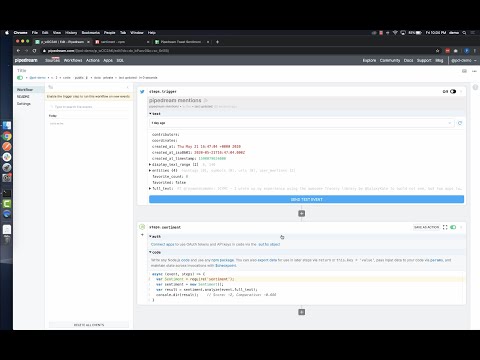What do you want to automate
with Google Sheets and Data Stores?
Prompt, edit and deploy AI agents that connect to Google Sheets, Data Stores and 3,000+ other apps in seconds.
Trusted by 1,000,000+ developers from startups to Fortune 500 companies
Popular Ways to Connect Google Sheets with Data Stores#
Popular Google Sheets and Data Stores Triggers#
Emit new event each time a comment is added to a spreadsheet.
Emit new event each time a row or rows are added to the bottom of a spreadsheet.
Emit new event each time a row or rows are added to the bottom of a spreadsheet.
Emit new event each time a row or cell is updated in a spreadsheet.
Popular Google Sheets and Data Stores Actions#
Add a single row of data to Google Sheets. Optionally insert the row at a specific index (e.g., row 2 to insert after headers, shifting existing data down). See the documentation
Add or update a single record in your Pipedream Data Store
Add multiple rows of data to a Google Sheet. See the documentation
Add or update multiple records to your Pipedream Data Store
Get all values or values from a range of cells using A1 notation. See the documentation
Overview of Google Sheets#
The Google Sheets API allows for the creation, reading, updating, and deletion of data within Google Sheets, enabling a robust platform for spreadsheet management and data manipulation. Through Pipedream, you can craft serverless workflows that respond to various triggers, such as webhook events, emails, or scheduled times, to interact with Google Sheets. This synergy can automate reporting, synchronize data across applications, manage inventory, track leads in a CRM, or even conduct survey analysis by updating and retrieving sheet data on the fly.
Connect Google Sheets#
import { axios } from "@pipedream/platform"
export default defineComponent({
props: {
google_sheets: {
type: "app",
app: "google_sheets",
}
},
async run({steps, $}) {
return await axios($, {
url: `https://www.googleapis.com/oauth2/v1/userinfo`,
headers: {
Authorization: `Bearer ${this.google_sheets.$auth.oauth_access_token}`,
},
})
},
})
Overview of Data Stores#
Data Stores are a key-value store that allow you to persist state and share data across workflows. You can perform CRUD operations, enabling dynamic data management within your serverless architecture. Use it to save results from API calls, user inputs, or interim data; then read, update, or enrich this data in subsequent steps or workflows. Data Stores simplify stateful logic and cross-workflow communication, making them ideal for tracking process statuses, aggregating metrics, or serving as a simple configuration store.
Connect Data Stores#
export default defineComponent({
props: {
myDataStore: {
type: "data_store",
},
},
async run({ steps, $ }) {
await this.myDataStore.set("key_here","Any serializable JSON as the value")
return await this.myDataStore.get("key_here")
},
})Related Videos#



Community Posts#


